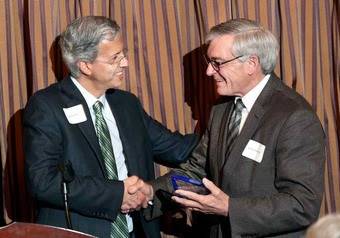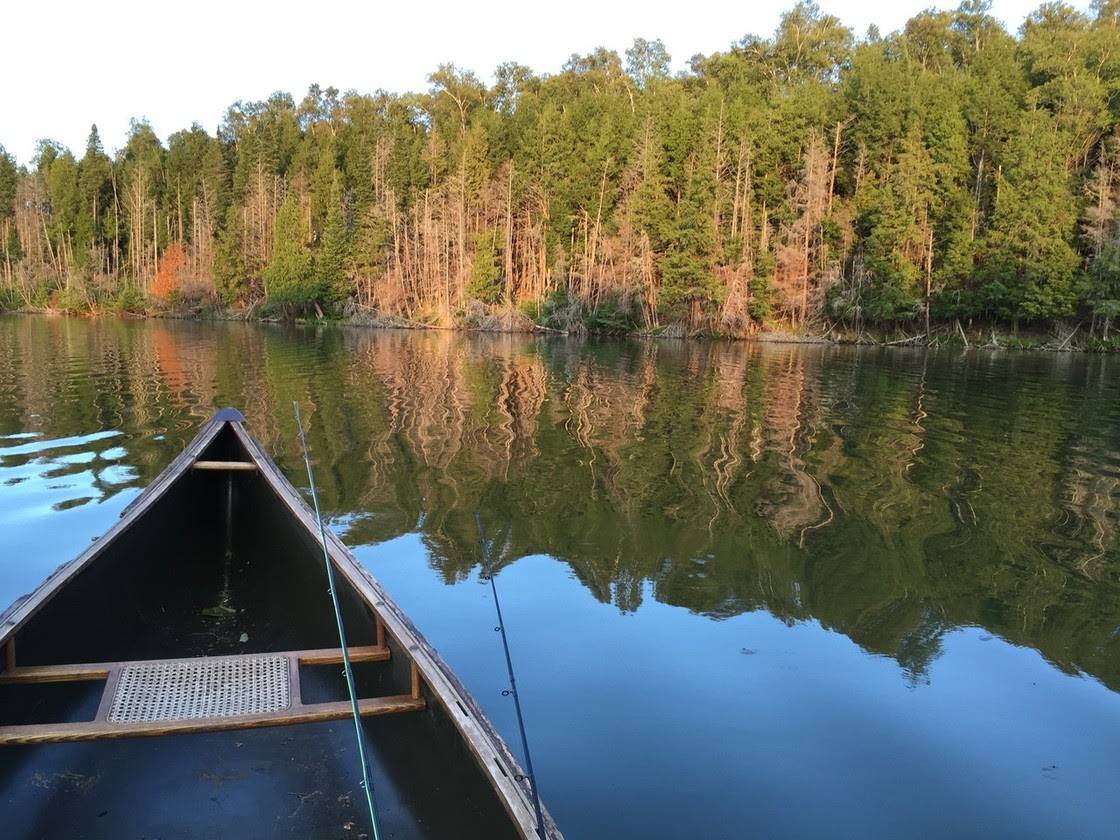Interfaith Insight - 2021
Permanent link for "Reflections on Earth Day 50 plus 1" by George Heartwell on April 20, 2021
“I was learning from the water; I was praying with the water.” -- Waasekom Niim
With Gabe, my then 12-year-old grandson, I glided across the mirror surface of Crooked Lake in the Sylvania Wilderness of Michigan’s western UP. We had broken camp just as the sun was rising, packed our gear in the Old Town canoe, and pulled out as daylight lit the far shore. The pair of bald eagles we had seen perched high in the towering white pine on the point last evening were back on watch this morning, perhaps looking for breakfast in the shallow water. No sound broke the morning stillness, no ripple troubled the lake surface save that of our paddles dipping into the water and our bow carving the glass that held the sky.
I asked of the water: “Will all this be here for Gabe’s grandchildren?”
The water whispered back, “It’s up to you.”
50 plus 1. That’s how many years ago the first Earth Day was observed. Climate change was not yet part of the vernacular, though it was recognized by a small cadre of climate scientists. Still, we knew – the world knew – even then, that Earth is fragile, its resources limited, its health threatened by toxic air emissions and water pollution.
50 plus 1. Are we better off today?
Species extinction, according to those scientists who map such things, exceeds 200 species per year, a rate of 1,000 times the natural extinction rate. That’s according to the World Wildlife Federation; which also notes other experts put the rate at 10 times these numbers. Climatologists give us not much more than a decade to stem the rate of climate warming before it reaches a “point of no return.” Non-point source pollution from agricultural run-off, municipal stormwater discharge, and faulty septic system backups are fouling the water of our rivers and lakes, stimulating growth of toxic algae and harming native plants, fish and waterfowl.
Still, I am hopeful.
Over 50+1 years, the ranks of the informed have swelled. We common folk understand environmental threats and restoration opportunities better now than on that first Earth Day. We are changing the way we live, changing the products we use, and changing our associations, in response to the cry of our ailing Earth. People are going to the streets to support the cause of the Earth. Legislators in all orders of government are hearing from constituents who are demanding good policy to protect the Earth. Children and youth are leading the way with action and projects to restore the Earth.
And in 50+1, local governments have recognized that Earth-care starts at home. Mayors and city councils all over the world are implementing strategic approaches to producing clean energy, protecting vulnerable waters, planting trees, and designing cities to accommodate cyclists and pedestrians. Grand Rapids has led the way in all these areas. In my closing days in local office, the United Nations credentialed me as a representative of U.S. mayors at the Paris climate conference, where I was encouraged by the presence of 600 Mayors from all nations of the world who were there to commit our communities to achieving the goals of the conference for climate protection. Grand Rapids has led the way in this arena, but we are surely not alone!
Further, I am encouraged by the dialogue taking place among people of goodwill with differing cultures, religions, and life experiences around questions of climate protection. I recently participated in a conference on Traditional Knowledge hosted by the International Joint Commission. The speakers and panelists were tribal and First Nations peoples of the U.S. and Canada, and the perspective they brought to ecological preservation was transformative for me. I heard a young woman of the Saugeen Nation refer to the relationship between humans and the rest of creation by saying “they are relatives, not resources.” She reminded us that Western knowledge – and even our language – creates hierarchies with humans at the top and everything else subordinate. In contrast, traditional knowledge refers to the interdependent web of life of which we are but a part.
All these things give me hope and inspire me, even in my “golden years,” to work harder to protect the environment.
That day Gabe and I paddled across Crooked Lake to a short portage to Mountain Lake. I had read that there was a stand of old-growth white pine on an island in Mountain Lake. I wanted to touch their massive trunks and look up into their spreading branches. But the first thing we saw as we touched the shore of the island was a leaning tree reaching out from the bank over the water. Gabe scampered up the trunk and jumped into the lake.
“Come on, Papa!”
All right… never too old!
Dripping wet, we walked into the cool of the old-growth pine forest. The ground was spongy soft from centuries’ accumulation of pine needles. The pine scent was intoxicating. Nothing else grew there in the dense shade from the spreading branches high above.
After stretching arms to barely touch fingertips around the base of a tree trunk, we lay down in the pine bed and just looked up at these giants.
“How old do you think they are, Papa?”
“I don’t know. Maybe 300, even 400, years.”
“When I have grandkids, I’m bringing them here. Do you think this tree will still be here?”
My voice caught in my throat. What could I tell him? That climate change with its new diseases and parasites, maybe even logging, could wipe this ancient grove from the face of the Earth? That the selfishness of me and my generation, our reckless disregard for nature, could destroy this treasury?
“Bring them here on Earth Day, Gabe, when they’re old enough to understand how precious this is. In the meantime, you and I have to do all we can to protect this tree.”
And the tree said, “Thank you.”
Posted on Permanent link for "Reflections on Earth Day 50 plus 1" by George Heartwell on April 20, 2021.



